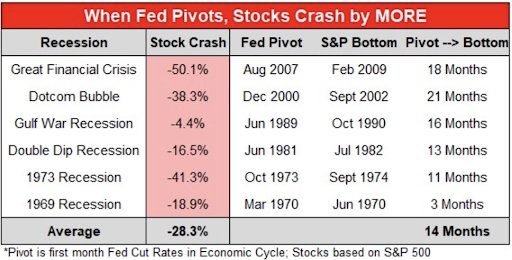It’s the one question many traders and investors, especially those just starting out, are always asking me…
“How do I pick the best stocks to trade?”
They’re looking for new ideas to add to their watchlists, or “hit list,” as I like to call it…
Learning how to pick the best stocks to trade is important because it makes up our pool of participants and trading opportunities. In other words, we need to make sure we screen for the best, strongest stocks possible.
I mean, there’s nothing worse than picking a stock from your hit list and then finding out that if you had picked a different one, you would have gotten a lot more.
So here are some basic blunders to avoid when learning how to pick the best stocks to trade…
How to Pick the Best Stocks to Trade: Make Sure There’s Reasonable Volume
The first thing you want to do when learning how to pick the best stocks to trade is look for volume.
Make sure whatever you’re trading has an average daily volume of at least 200,000 shares.
While this is a conservative figure, there’s a reason why my threshold is low…
Some stocks that have volume of less than 1,000,000 shares per day are often ignored by institutional traders or mutual funds.
The less institutional sponsorship your stock has, the less correlation it’ll have to the rest of the market.
But some of the best trading ideas have come from stocks with an average daily volume of more than 200,000 and less than 1,000,000 shares.
Stocks with this amount of volume also tend to be extra volatile because during heavy trading, there are less traders taking the opposite side.
This is another benefit of learning how to pick the best stocks to trade.
How to Pick the Best Stocks to Trade: We Need Volatility
This brings me to the second part of what’s necessary for a stock to make it on my hit list…
It has to have above-average volatility.
There are several ways to learn how to pick the best stocks to trade based on volatility.
Some are simple while others are more complex…
But for the purpose of this tutorial, I’ll keep it simple. And once you get comfortable with it, you can always expand on it.
In a nutshell, you want to make sure the stock you’re trading has a daily dollar range above $2.
This means on average, the stock has to swing about $2 or more per day.
Some stocks go through periods when they’re volatile. But when they’re calm, what you want to do is look at the past 10 trading days.
What you want to see is volatility increasing to a point where the stock is covering more than $2 in trading range each day.
My suggestion is to write this down in a notebook.
I would also stay away from stocks priced under $20 because they typically don’t have a wide trading range on a regular basis, and tend to be less volatile overall.
So remember, when learning how to pick the best stocks to trade, you want to avoid companies with shares under $20.
How to Pick the Best Stocks to Trade: Don’t Ignore Correlation
The biggest mistake beginners tend to make when learning how to pick the best stocks to trade is ignoring correlation rules.
Correlation is one of the most important factors as far as risk is concerned, so ignoring this rule will increase your risk and, as a result, decrease your odds of being successful.
In simple terms, correlation is how closely your stocks follow each other…
For example, if you look at two similar companies in similar industries or sectors, they may follow each other and trade almost identically.
If you take two stocks from two different industry groups like shoe manufacturing and gold, or software manufacturing and oil production companies, your correlation between stocks will be smaller.
All stocks have some degree of correlation to the broader market. But the more institutional sponsorship a stock has, the more it will correlate.
This is one of the main reasons I mentioned learning how to pick stocks to trade with reasonable volume, but not too much.
These stocks will be less correlated, giving you some diversification.
The last thing you want is to have 10 stocks in your portfolio that just follow the market. I mean, you might as well just trade the index fund and save yourself broker commission fees if you want to trade this way.
How to Pick the Best Stocks to Trade: Picking 10 Different Stocks in the Same Industry Group Isn’t Diversification
Many traders think just because they have 10 different companies, they’re diversified…
But the companies you buy need a sufficient degree of separation from each other to avoid having a high degree of correlation…
And there’s no better way to learn this material in the beginning than by looking at the markets and figuring it out on your own.
If you have any questions about how I pick the best stocks I trade or topics you’d like me to cover in future articles, please don’t hesitate to contact me at [email protected]
For more on this topic, please go to: The Best Ways to Improve 2 Key Aspects of Your Trading and 2 Swing Trading Rules to Follow for Bigger Gains.
All the best,
Roger Scott
Senior Strategist, WealthPress




